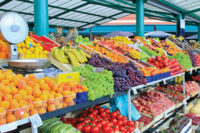Grapefruit Juice and Drug Interactions

In a study, authors Paul F. Cancalon, Santiago M. Barros, Carl Haun and Wilbur W. Widmer investigated, juice processing and storage parameters. Prolonged fruit storage prior to processing and most steps involved in juice processing had little influence on the levels of 6′,7′-dihydroxybergamottin (DHB), paradisin C, or bergamottin. However, products that were hot filled or stored at room temperature had lower amounts of DHB and paradisin C and higher amounts of bergaptol compared to juices that were not hot filled and stored at refrigerated temperatures. Both DHB and paradisin C are potent CYP3A4 inhibitors, while bergaptol is a very weak inhibitor. Bergamottin amounts decreased to a lesser extent. Therefore, grapefruit juice products that were hot filled or have been stored at room temperature for an extended period of time will have a reduced drug interaction potential.
From the May 19, 2011, Prepared Foods' Daily News.
Looking for a reprint of this article?
From high-res PDFs to custom plaques, order your copy today!




